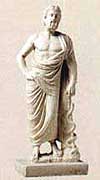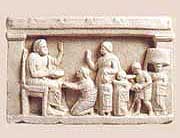Education
Boys went to school between the ages of seven and fifteen. All citizens were expected to send their sons to school, but as fees were charged, poor boys propably did not stay very long. A boy from a wealthy family was taken to school by a slave called the pedagogue, who would stay during the lessons, possibly helping to keep order in the classroom. Schools taught reading, writing and sums, music, poetry, sport and gymnastics.



